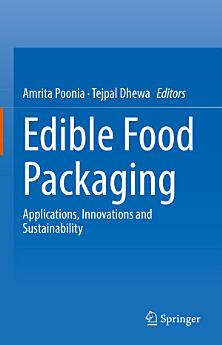Edible Food Packaging: Applications, Innovations and Sustainability
About this ebook
As a world foreseeing food technology revolution, this book explores the unique topics in food packaging which possesses mammoth commercial applications and environmental potential. Due to its immense scope, this book is highly useful for researchers, food scientists, students and food packaging industry experts.
About the author
Amrita Poonia is working as an Assistant Professor in the Department of Dairy Science and Food Technology, Institute of Agricultural Sciences, Banaras Hindu University, Varanasi, Uttar Pradesh, India. She has published two laboratory manuals, more than 15 book chapters at National and International level. Dr. Poonia has conducted/ offered a Massive Open Online Course (MOOC) under agMOOCs on Functional Foods: Concept, Technology and Health Benefits from (8 October, 2018 to 19 November, 2018) and awarded with the Certificate of Appreciation for offering a Massive Open Online Course (MOOC) under agMOOCs, by Commonwealth of Learning (COL) Canada. She has published more than 50 publications in esteemed National and International Journals. She has successfully completed a project on “Identification of Food borne pathogen (Listeria monocytogenes) in Shrikhand Using PCR (Polymerase Chain Reaction)” at BHU & supervised 2 Ph.D scholars, 28 M.Sc students and 2 Ph. D scholars are perusing theirresearch under her supervision.
Tejpal Dhewa is a faculty in the School of Life Sciences, Central University of Haryana, Mahendergarh. He is the Coordinator, Food Safety Training and Certification (FoSTaC) Centre, Food Safety and Standards Authority of India (FSSAI), and University SWAYAM Coordinator- Central University of Haryana. Dr. Dhewa is a Course Coordinator of SWAYAM UGC MOOC on “Food Microbiology and Food Safety”. Dr. Dhewa has a diverse industrial, teaching, and research experience. He has published his research works in national and international journals. Dr. Dhewa also supervised several master’s theses/dissertations. He has successfully completed DU innovation project (2013-2015), and conducted short-term courses on “Food Safety, Food Security, and Food Regulations: A Primer” from September 16-20, 2018; “Metabolomics in Food and Nutrition Science Research: From Concepts to Applications” from February 15-19, 2019. “Food Fortification and Human Health: From Concepts to Public Health Applications” from September 9-13, 2019 under the Ministry of Human Resource Development (MHRD).




